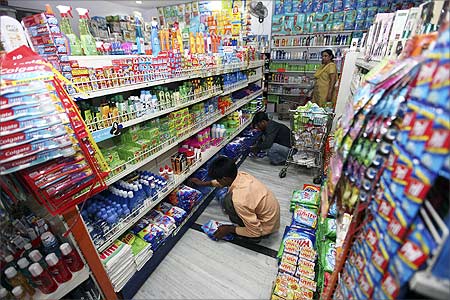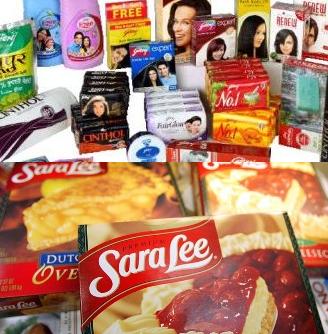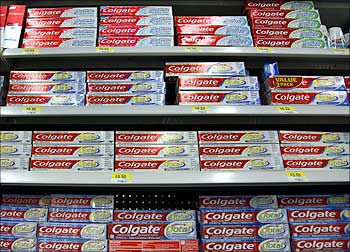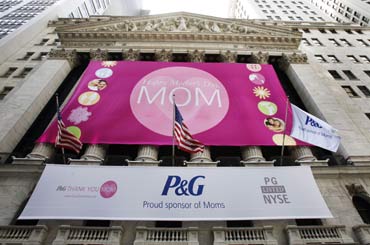Viveat Susan Pinto in Mumbai
Good old brands are finding their way into the portfolios of some of the top fast moving consumer goods companies in the country.
They may be small but that hasn't prevented them from finding their way into the product portfolios of some of the top fast moving consumer goods companies in the country.
Iconic consumer brands are much in demand today.
Sample this: Godrej Consumer recently snapped up Swastik Shikakhai, Swastik Neem and Genteel from the Mumbai-based Priya Kothari family.
Jyothy Laboratories is in talks with the Kolkata-based Safechem Industries to acquire its Safed detergent brand.
. . .
How old consumer brands are making it big
Earlier this year, contract manufacturer VVF Limited, which is based in Mumbai, acquired Aramusk, one of the oldest male deodarant brands in the country alongwith Moloy soaps and Mahabringol hair oil from Chennai-based Henkel Ltd.
These acquisitions come on the back of a few more wrapped up in the last few years.
For instance, Dabur acquired Nasik-based Fem Care Pharma, makers of the popular Fem fairness bleach, in 2008.
Before this Dabur had acquired three Balsara group companies giving it access to iconic brands such as Babool, Meswak, Odomos, Odopic and Odonil.
Competitors Emami and Wipro Consumer Care have also not been far behind in the race to acquire a few old brand such as Zandu Pharmaceuticals, makers of the popular Zandu balm, which opted to sell out to Emami in 2008 or Chandrika soap which went to Wipro after a fierce battle in 2003.
. . .
How old consumer brands are making it big
Barring Zandu, Fem and Balsara, which were company acquisitions -- not brand acquisitions -- most of the others have not been large in size.
The brands acquired by GCPL, for instance, cost less than Rs 50 crore (Rs 500 million), which chairman Adi Godrej said would be funded through internal accruals. GCPL has a cash and bank balance of Rs 246 crore (Rs 2.46 billion) -- sufficient enough to fund a transaction of this size, say FMCG analysts.
The same goes for Jyothy, whose likely acquisition of Safed will not pinch it too hard, say persons familiar with the development. Jyothy, for the rececord, has a cash and bank balance of Rs 275 crore (Rs 2.75 billion), which, along with its recent qualified institutional placement of Rs 228 crore (Rs 2.28 billion), should help the firm wrap up a few regional buys including Safed, says company chairman M P Ramachandran VVF is also said to have bought the Aramusk, Moloy and Mahabringol brands for Rs 23 crore only.
. . .
How old consumer brands are making it big
Despite this, the question still remains: What is driving interest in these brands among FMCG companies today?
"Their residual brand value," says Viren Razdan, managing director, Interbrand India. "These brands have ingrained themselves in the consciouness of consumers.
"They may not have the bandwidth to continue advertising like the way they used to, but somehow you know of them, you remember them.
"Which is what interests FMCG companies who are on the lookout for good products in their portfolio," says Razdan.
Santosh Desai, chief executive officer, Future Brands, says, "Companies seek products that have a strategic fit with their portfolios, if they find one amongst old brands, nothing like it.
. . .
How old consumer brands are making it big
"That is because you don't have to start from scratch with these products. They have an equity of their own, which can be strengthened following acquisition."
That is precisely what Wipro did with Chandrika or Dabur did with Babool and Meswak -- built on their brand equity to reposition them as modern brands. Sales of Chandrika, which is an Ayurvedic soap is closer to Rs 60 crore (Rs 600 million), according to sources in the know, an over two-fold jump since acquisition in 2003, when sales were Rs 28 crore (Rs 280 million).
Babool, on the other hand, has been growing at a steady clip of about 25 per cent to emerge as a Rs 180-crore-brand (Rs 1.8 billion) in comparison to the scenario five years ago, when sales were under Rs 50 crore. Dabur, acquired the Balsara businesses -- Balsara Home Products, Balsara Hygiene Products and Besta Cosmetics in 2005.
. . .
How old consumer brands are making it big
Meswak, positioned like Babool on the herbal plank, is a smaller brand in comparison to the latter at about Rs 90 crore (Rs 900 million).
"But Meswak has been growing too," says Sunil Duggal, chief executive officer, Dabur Ltd. Alongwith in-house brand Dabur Red Toothpaste, which has a turnover of Rs 100 crore (Rs 1 billion), both acquired brands have pushed Dabur's oral care share to about 15 per cent in the Rs 2,500-crore (Rs 25-billion) toothpaste market, which has competitors such as Colgate-Palmolive at over 52 per cent share and Hindustan Unilever at about 26 per cent share respectively.








article